|
|
| 'Like' us on Facebook | Follow us: |
Posted on: Sept 29, 2014
A Deep & Divine Devi Connection
Part 03
KM: In your legal fraternity, how do your peers view your approach to work and the many worlds that you straddle - the Sai Trust along with your professional commitments?
SSN: If you are walking the rightful path, truth will always prevail. In fact, there was one occasion when I had to complain to the Chief Justice about the corruption of one of our High Court judges. The incident turned out extremely bitter and dragged on for some time to the point that some of my colleagues said I must be mad to get involved in these things.
I was upfront in informing the Chief Justice. My words had the desired effect. A few months later I got a call from him asking me to meet him at his house. I knew it had something to do with our conversation. After a cup of coffee, the Chief Justice asked, “Will you accept judgeship? I want you to be a High Court judge.” The very fact that he considered me suitable enough for the position was enough to reaffirm the fact that truth always win and if you are on the right track, you will be seen as worthy.
Much later, another incident took place. We had a very corrupt Chief Justice in our High Court who was about to be elevated to the Supreme Court. The judges raised a protest and I also joined in the agitation. One day, when I stood up to argue a matter in Supreme Court, one of the judges asked me, “Naganand, what are you up to in Bangalore?” He was referring to the agitation that I was a part of. I was a little taken aback by that question. I said, “Your Lordship should kindly rephrase that question and ask what the judges in Bangalore are doing.” He said, “Why, why, why? What happened?” I briefly explained to him the situation. I told him there was an allegation of corruption against the Chief Justice and so it was only right for the lawyers to protest. We had a frank and open conversation. After this, the entire Supreme Court came and congratulated me for standing by the truth. By and large people do recognize in their heart that doing the right thing, saying the right thing, being truthful are all good qualities. But most of them are scared to publicly admit this. So, somebody who fearlessly pledges to stand by the truth regardless of the consequences will always end up gaining the respect of the others.
KM: But at times you also pay a price for standing by the truth, it’s not always the most popular choice.
SSN: That’s right, you need to be prepared to pay that price if you want to stand by truth. We just have to look at history to realize this. What a price Satya Harishchandra paid for standing by the truth! He lost everything in his life, his wife, his only child, he had nothing in the end. Why? Only because he took a vow of truth. By those standards, the price we end up paying is much less. We should be prepared to pay a higher price.
KM: You have a growing law firm and you mentor a lot of younger lawyers, including your three of your young daughters. What is the most important message that you give them?
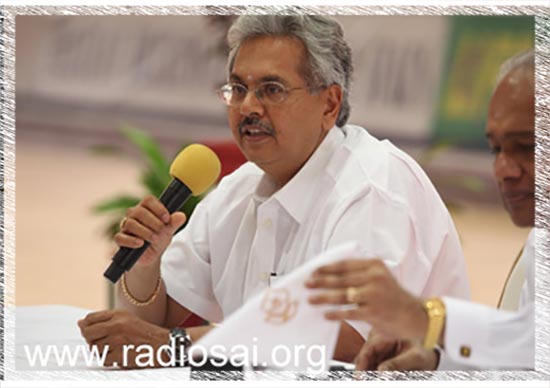 |
SSN: Apart from our law firm that has about 20 lawyers, we get a constant stream of interns. I give them two messages - that there is no substitute to hard work and if you really don’t burn the midnight oil you cannot claim to be a good lawyer. You have to put in long hours of work. The second message I instil in them is the importance of abiding by ethical practices. Adopting these two principles will easily earn a reputation for anyone – a reputation that will forever stay with you.
In our line of work, it is very easy to make some quick buck but again word will quickly go round and everyone will know what kind of a lawyer you are. Even today, when I receive briefs from my clients, many a times I know it has come to me for a particular reason – because the client is a highly influential, corrupt person and wants to be represented by a lawyer who cannot be corrupted and will not indulge in corruption, who will stick by truth, who’ll do the best for the client under any circumstances. That’s the level of confidence with which they come. The reason I tell young lawyers why it is so important for them to maintain this sense of extreme rectitude.
KM: Do you feel optimistic about the future with our young generation of lawyers?
SSN: I think the young crop of lawyers are extremely capable and come with sound educational backgrounds. I am very hopeful of the future.
KM: You are involved with the Central Trust, the Media Foundation, the Medical Trust and so on. Are there any mechanisms in place to ensure that the next generation has a smooth transition into it? Handing over of the baton as we go on?
SSN: The transition is already happening. A number of former students hold various positions in the Trust. They work with the Medical Hospital establishments and the Ashram itself. Two former students occupy key positions in the University. Just before Swami’s Maha Samadhi, He had given clear indication and direction to integrate His alumni into the workings of the various Trusts. Also, the Central Trust Board of Trustees is the apex body that takes the final decision.
And there is a move to constitute committees in which we will induct persons who are closely involved in Swami’s Mission including young students who have recently graduated from His institutions. The Vidya Vahini project, for instance, is now administratively headed by Satyajit who was very close to Swami as his aide. Of course, he is functioning under the auspices of the Trust and the Secretary of the Trust. Similarly, streams of activities are being guided by groups of young people. And all of them are completely devoted to Swami with a sound understanding of His message.
KM: What is your take on how Radio Sai has evolved?
SSN: I would like to share a short story before I talk about Radio Sai.
It was the time when Chaitanya Jyothi was under construction. One day while we were sitting for darshan, Swami came out of the interview room and looked at me and said, “Sit in the car.” I went and waited by the car door, He came and occupied His seat and then I sat down. Of course, I didn’t say anything and Swami didn’t tell me where He was taking me. The car just drove along left, right, left, right and finally we arrived at the Chaitanya Jyothi site. Swami stopped the car there and explained about the building that would take shape there. After a good conversation, we returned. I must add that some days before this incident, we were talking about whether there was internet in the ashram and the university and I was little surprised to learn that Swami was not in favour of the internet. So, on our way back from Chaitanya Jyothi, I took that opportunity and - if I can call it that - gave a big lecture on the internet. I shouldn’t have done that but anyway I went on and on asking Swami - do you know what is internet, how it works, how it helps! Swami calmly said, “That’s all crazy stuff.”
Still, I didn’t give up. I said, “Swami, you are 100% right, there is a lot of nonsense in it but we want Swami to be in it. How many people all over the world would like to see Swami and how many people - your students, your devotees would like to see what is happening here in the ashram, have darshan?.” I went on, “Swami good things have to be put on internet and if you permit, this can easily be done.” He was very quiet. On the way, we stopped when we saw Sai Geeta. Swami played with her little a while, fed her and came back. The minute I got down from the car after we returned, He looked at me, and said, “Whatever you told Me, explain to Mr. Chakravarthi and I will instruct.”
KM: That was a very quick sales pitch you made there!
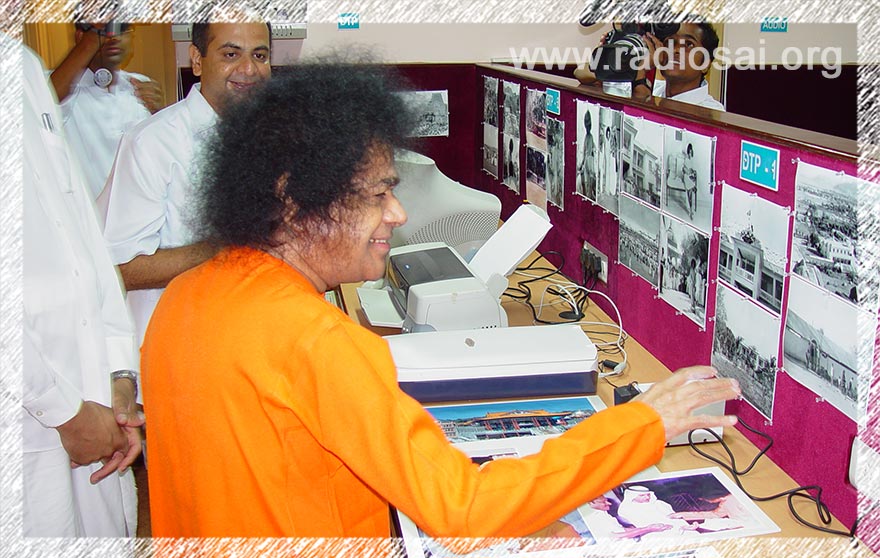 |
| Bhagawan in the Studios of Radio Sai during the inauguration of the building, 29 Aug 2002 |
SSN: When I got off the car, I took Swami’s leave and came away. Some two or three hours later, I reached the office and Mr. Chakravarthi frantically called me and said in Tamil, “What did you tell Swami? Swami was talking about internet, internet what have you told Swami about internet?” I understood that Swami must have spoken to him during lunch. I explained to Mr. Chakravarthi and said, “Sir this is what I mentioned to Swami that we need to have a website of our own.” He replied, “Who is going to do all this?” I told him not to worry and I had somebody in mind. I called a friend of mine, and believe it or not that same evening, we had a format of a website with Swami’s photos. My friend brought his laptop to my office at 7 in the evening to take me through the provisionary layout of the website. I asked him to bring it the next day to Puttaparthi. So, the team - Mr. Manohar Shetty and Mr. Madhav Murthi came here. They met Mr. Chakravarthi, showed him the layout. Mr. Chakravathi then explained to Bhagawan and He said, “I’ll give you three students.” He put Satyajit and two others on the job and the team started working together. The homepage of the website had Swami sitting on the joola (swing). Interestingly, the day we showed the website format to Swami, He was in Brindavan sitting on that very joola when we set up the computer for Him. We took Him through the whole portal and He approved the project.
KM: This was the website for the Central Trust?
SSN: That’s right. So, now we can go back to your question about Radio Sai. The reason I narrated that incident was because the website was the first media activity to be directly blessed by Bhagawan. We then added music to the portal and Swami would occasionally listen to the music. Thereafter, when we told Him, “Swami there are so many things that are happening here and we need to disseminate all of this to the world - your devotees are everywhere.” He asked, “So, what should we do?” Thus the Media Foundation was born and Swami very kindly blessed Dr Venkataraman to head this. Today, with the able guidance of Professor Venkataraman we have reached where we are now with two international worldwide radio channels in Telugu and English. The journey has been fantastic. And I must say, Radio Sai offers a great service for which the credit largely goes to the band of dedicated students who have an one point agenda and that agenda is to work, work, more work and more professional work.
KM: Radio Sai has a huge following worldwide and there are many who would like to know what lies ahead for the medium. Could you share your thoughts with us?
SSN: Radio Sai is like the foundation of the Media Foundation and we need to build on the foundation. Radio Sai is available on internet as web based programmes. But that is not enough, we need to reach out to the man on the street who is more connected to the medium of television. We are studying the option of getting Swami’s message across on to mainstream television channels and FM radio stations throughout the country. This is where we ought to be looking at as there is a dearth of good devotional material on these channels.
KM: Your lives have been driven by Swami. What would you like history to remember you both for?
SSN: I would not like history to remember me. I would like history to remember Swami.
MN: I agree with that, it’s more important for everyone to remember Swami.
SSN: The role play that all of us are engaged in is of minimum consequence. Let’s take this scenario - you have an office and you have an office boy who brings in tea and takes away your cups - nobody wants him to be remembered. This is the same way in Swami’s mission. Personally, I travel extensively, visit centres worldwide. But why is it that millions of people all over the world come to these centres? Only because of Swami, because of what Swami has told them, because of Swami’s teachings, His love and His guidance and how that has enriched their lives. And, that should be the focus. I would prefer history to forget us, we are just bystanders, not the protagonist!
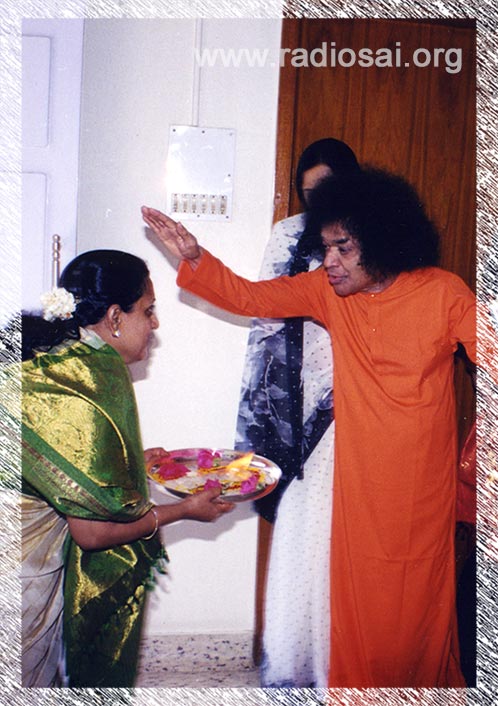 |
MN: Swami is the doer. Everything is happening because He has put you in that place and He is making things work. So, we should remember Him rather than remembering people.
SSN: Allow me to share an example.
I was arguing a case in the Supreme Court one day and suddenly the judge stopped me and said, “I know you.”
I was a little taken aback and looked at him intently wondering how he knew me. And then, the judge said, “I have visited you in your house.”
And he says this in the middle of the trial, while the case was going on. The other lawyers in the court were all perplexed and wondering what was going on. And, then he said, “You took me to see Baba.” Suddenly it all came back to me that when he was a judge in the Calcutta High Court, he was visiting Bangalore. A sitting judge in the Karnataka High Court called me then to say, “There’s a judge from Calcutta who is here on holiday and he heard that Swami is in Whitefield. Could you take him there for Swami’s darshan?” I replied that he could certainly visit Whitefield and I would make sure he was seated in the area for dignitaries, but I wouldn’t be able to help him gain an interview with Swami as that was in His hands alone. When this judge and his wife visited Parthi, they were lucky to receive Swami‘s darshan. Swami even took his visiting card. That evening, we invited them home for a meal along with other judges. But, I had completely forgotten this incident while he remembered!
The point I am trying to make is that when you are acting for Swami, in Swami’s Organisation, you can always drop names and say that you know this person or that person because you are always meeting or interacting with people of some standing. But your demeanour should be to forget about these things and that’s exactly what Swami inspired me to do that day in court. Of course, I had to apologise to him and thanked him for reminding me about our meeting.
KM: A lot of devotees who come to share their account have spoken about a period in their relationship with Swami put them through a testing period – let’s call it the ‘ice’ period – where He wouldn’t acknowledge you and have any personal interactions so to speak, just to check them out and see how sound they were. Did you have any such experience?
MN: For nearly 12 years when we were busy raising our children, our interactions with Swami were very limited, it was like a gap. We would intermittently meet Him, but it was never like an interview.
Probably that was the time space given for the children to grow up.
Swami always enquired about them and called them to speak to them when they were around four years old.
The only other minor disconnect I felt was when I lost my father, because at the time we were always in his shadow. He shared a very affectionate relationship with Swami. He passed away very suddenly – he had a heart attack while arguing in court. When I visited Parthi and Swami came into the veranda where I was seated, He saw me. I was very emotional and told Him about my father passing away. He said, “Yes, yes I know He is with me and you don’t have to grieve now. You are going to be with me.” It was shortly after that one thing or the other kept coming my way that kept me in Swami’s aura. And, I kept coming back more frequently. We would be here almost every week.
SSN: Since the year 2000 or so, we have been visiting Parthi practically every week.
MN: For us, we alternate our weekends between going to our temple in Bangalore and coming to Parthi.
KM: But Mr. Naganand, you travel a lot, your work takes you out of India. How does it feel to witness how vast the movement is outside with so many Sai Centres around the world?
SSN: It’s a fantastic feeling. Whenever I visit these centres, the devotees clamour for information about Swami, their love for Him is so immense and overwhelming. The minute they learn that somebody has come from Puttaparthi, they feel as if Swami Himself has come.
And they want to talk to you, ask every possible question about what He said, and what He did – so insatiable is their thirst for Swami.
KM: And it’s amazing how devotees everywhere in the world have their direct one-on-one with Swami.
SSN: There are so many devotees who have not come physically anywhere near Bhagawan.
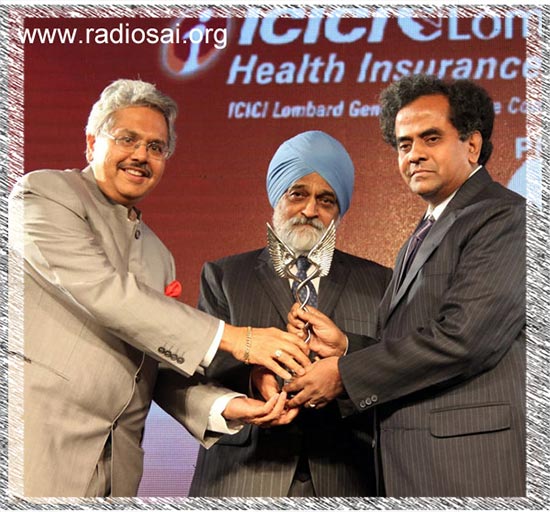 |
|
| Mr. Naganand and Dr. Narasimhan receiving the CNBC-TV18's Health Care Awards on behalf of the Sri Sathya Sai Mobile Hospital, 23 Dec 2013 |
They have never had a darshan, sparshan or His blessing or interview but still feel such oneness with Bhagawan. You know I think that is the most amazing part of Bhagawan’s Avatar.
MN: My youngest daughter tends to argue a lot when it comes to Baba. She knows Swami is God but her one grouse is that whenever she talks to me, I speak of Swami. She gets exasperated and says, “Mom you cannot talk about anything other than Swami!” One day, she had to go on a field trip. That morning when she was getting ready, as always I said something about Baba and she said, “Mom, I don’t want to talk you, you only speak about Swami” and left. While sitting in her friend’s car, she noticed a picture of Swami in the car. When her friend told her that he was a devotee of Swami, she asked him if he had seen Him. He said that he hadn’t ever seen or spoken to Him. One thing led to another and they ended up talking about Swami from morning till evening. When she returned home, she said, “Ma I have to tell you something. I was upset at you in the morning for talking about Swami but I ended up doing only that the whole day.” So, it’s not you who is in charge of your actions, Swami is the wire puller. It’s beyond our control.
KM: You are a family of lawyers, do you all argue a lot at home?
SSN: I don’t think we argue but they always have an argument against me! Whenever I try to reason out with them, they say, “Don’t try your lawyer tricks at home, leave them in the office.”
KM: How have you felt after the Maha Samadhi?
MN: Swami is always there, He has left His Physical Form but that does not mean He is gone, He is here always. In fact a few days ago, I was very sad for some reason and missing Swami. That night I got a dream. Swami said, “Why this long face, why are you sad?” I said, “I am not seeing you Baba.” He said, “Who said I am not there, I am here, see.” That is the essence, He is here. You feel His presence here. He is always going to be here.
SSN: With our limited human mind, we are trying to conceive God. We are trying to put Him into some kind of a straight-jacketed formula to say well you know God is here, He is there, He is not there. Swami throughout in all His discourses has said, “This body is not Bhagawan, I am not Bhagawan. You think Bhagawan is in this body? You think that Bhagawan is this size? This is all it is? No.” He said, “I am everywhere. I am all pervading, you only see Me in this fashion. And I am so great that you cannot imagine Me. Nor can you perceive Me!” Swami came like a passing cloud through this world through His 86 years on this planet to show us how God conducts Himself with you. To prove to you that He is an embodiment of love. I would now like to narrate an incident when Bhagawan wept for a boy.
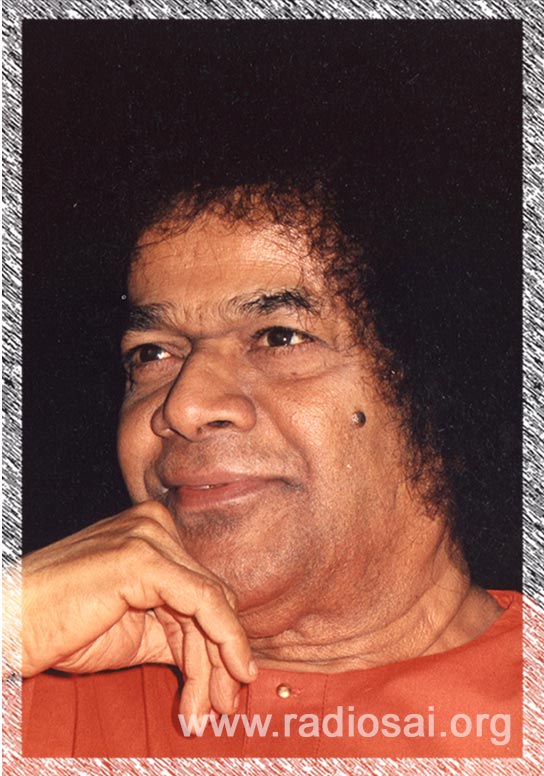 |
One day, I was invited for lunch at Poorna Chandra. Swami was sitting there. I sat on the sofa and a boy came and stood next to Him. Swami looked at the boy and asked me, “Do you know who that is?” I said, “Yes, Swami I have seen this boy. He works in your kitchen.” Swami looked at Him again and suddenly started crying, literally weeping and sobbing away. After two or three minutes He stopped, dried His eyes and said, “You know that boy has nobody for him.” I kept quiet. And then He said, “You know where he is from? He is from your state, from Kodagu.” That’s a district in Coorg. He said, “There was nobody looking after him so I brought him here.” He then told me to ask the boy if he was happy. So I said, “Swami wants to know if you are happy here?” When I said this, the boy started crying, so overwhelmed was he.
What I’m trying to say is that Bhagawan is the embodiment of everything in the Universe. He was talking on such affectionate terms and feeling such empathy for the boy that He actually started weeping. I was astonished because most of us don’t spare so much thought for the persons working in our house. We would normally overlook these things. But the way Bhagawan connected with him was amazing. What’s even more amazing is that He connected in the same way with everybody in this world, with every single living being, not just human being. So, we cannot really say Swami is God in this Form and that’s it. He is eternal, always there.
MN: I would like to share an incident too that we were fortunate to experience.
My two year old granddaughter and I were in our altar at home where we have a large size photo of Swami. Swami’s picture was behind me. The baby was lying on the cot and troubling a bit to drink her milk. I said, “If Swami sees He’ll get upset, drink your milk.” Suddenly, she pointed at the picture and said, “He said yes drink milk.” Now nobody has taught the child this, but she saw the response in that very picture. And after the Maha Samadhi, a few days later, we had gone abroad and this little girl called me and said, “Baba told me He is tired, He is hungry and He is thirsty.”
She said that He also told her, “I want to eat and rest to become strong and come back.”
KM: Your two-year old granddaughter seems to have inherited your intuitive abilities.
MN: She would interact with Swami a lot, for instance she would be standing with me and whenever Swami came, He would want her to come close, take the packet of vibhuti and go.
She was eight months old when Swami wanted her to be brought closer. I was carrying her in my arms. She was very tiny and thought that she might drop the packet of vibhuti - so held on to her hand. Because my hand was there, Swami just pulled that packet back. He wanted her to come and take it from His hand.
KM: Even with her He had his own direct connection.
MN: The minute she saw Him, she said “Baba.” And you should have seen Swami’s face, His expression was so wonderful.
SSN: And, every week, she would ask her mother to telephone and say, “Tata Ji if you are going to Puttaparthi, I am coming.” Her bag would be packed and she would be sitting outside her house.
MN: She would be the first to sit in the car before us.
I remember hearing several times that Swami never liked to say ‘hi’ and ‘bye’ He would say ‘what is this hi, bye’. One day, when Swami came, this child said, “Swami hi.” Baba stopped, and said “Hi”. And when He was leaving, she said, “Baba, bye.” So again Swami stopped the chair, turned and said, “Bye.”
KM: He is a mirror of purity and love, and He was just reflecting the baby’s sincere emotion.
MN: After the Maha Samadhi, we were not in Bangalore and she saw the news on the television channels. She knew something was wrong with Baba and started crying that she wanted to see Baba. My daughter was little worried whether she would be able to see Him and whether she would get scared. I said, “She has been seeing Swami since she was a baby. She must see Him in this state also, bring her.” So at 2 o’clock in the night when we came here and saw that Baba’s face was a little discoloured, she said, “Abhu, He got hurt?” I said, “Yes.” She took pradakshina three times and did namaskar and she said, “Baba bye, see You.” So, they had their one to one relationship.
KM: Mrs Naganand, you are a mother of three successful young ladies who are all lawyers. But personally you chose to be a stay-at-home mom and take care of your family. My question is about young women professionals who are also devoted to Swami and committed to His values. What advice would you give them on how to prioritize between home and work?
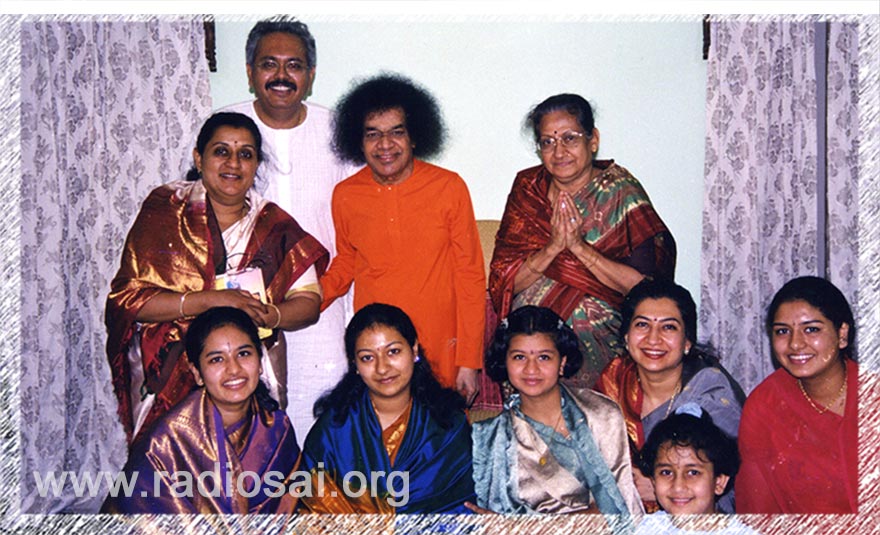 |
MN: You must carry on your work but always keep God in mind, never forget Him.
Always make sure that He is always there in your life, His presence is felt. Never say that God does not exist. You must continue doing your work with sincerity. God does not ask you to sit 24 hours and do pooja. It is enough for you to just think about Him, even for a minute. No one is stopping you from managing your profession.
KM: But you cannot be in both places at once if you have young children at home and your professional commitments are as demanding.
MN: It is important to give some years of your life to children when you have brought them into this world.
You need to give them 100%. Once they are on their own, let’s say when they start school full time, you can take up your profession and get back to your career.
SSN: In our own family our elder daughter has two children. The second one is a year and a half. Although she’s a qualified lawyer and has her Master’s from George Washington University, both she and her husband agreed that she would not go back to work until both their children were ready to attend full time school. So, I think dedicating those three or four years to your children is not a bad bargain! On the contrary, it will help lay solid foundations for a healthy family.
KM: Your final thoughts?
SSN: I would like to conclude recreating the blissful experience of our interviews with Swami. It is a relationship between a devotee and God with nothing in between. The whole world just ceases to exist when Swami looks into your eyes and you look at Him. It is only Him and you and nothing else. Everything else gets obliterated except this two way relationship. It’s a relationship between us and the Universal Father.
- Radio Sai Team
| comments powered by Disqus |
What do you think about this article? Please let us know by writing in to h2h@radiosai.org. Do not forget to mention your name and country.








